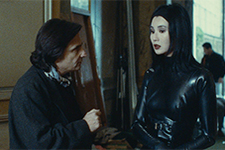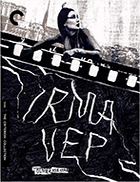Irma Vep
|  The title of Olivier Assayas’s sixth feature Irma Vep is borrowed from the main character of Louis Feulliade’s 1915–16 serial Les vampires, a cornerstone of both early silent narrative and French cinema. In Assayas’s kinetic, self-reflexive film, Les vampires is being remade by an obsessive, past-his-prime (and possibly insane) French auteur with an international cast and an enormous budget at a time when global cinema was going through seismic changes that were only beginning to be recognized. It is to Assayas’s credit that he sensed the enormity of these shifts in film production, distribution, and reception as they were happening in the mid-1990s and sought to capture them in some way. However messy, conflicted, and cracked Irma Vep may be, it stands as a sometimes profound and always engaging portrait of film production on the edge. Maggie Cheung, in her first film made outside of Hong Kong, stars as a thinly veiled version of herself. Having just recently finished a martial arts action film, the genre for which she was best known at the time, she has been cast by the French director René Vidal (Jean-Pierre Léaud) to play the coveted role of Irma Vep, a mysterious, latex-cat-suited burglar, in his lavish remake of Les vampires. The very fact that Vidal is remaking a classic of silent French cinema is already potential heresy, but his recruiting an Asian actress to recreate the role originated by French icon Musidora highlights the cultural conflicts of international co-productions and the myriad issues involving race and ethnicity in casting. Cheung’s character is one of tolerance and balance, as she tries to navigate the difficult interpersonal conflicts swirling all around her, some of which are artistic, some of which are financial, and some of which are romantic. By all accounts Vidal is a washed-up former genius reaching in vain to recapture his former glory, and most of the production personnel question his artistic decisions, which they see as a manifestation of his emotional and mental cracking. Cheung is willing to listen to his vision and try to bring it to life, even as she senses that his interest in her may be more than professional, and she finds herself increasingly in the position of having to defend his work to those around her. She is also lusted after by Zoé (Nathalie Richard), the costume designer responsible for creating her iconic catsuit, which Vidal wants to be a reflection of Michelle Pfeiffer’s Catwoman suit in Batman Returns (1992), one of dozens of film references that conflate all manner of international cinema past and present. At another point Cheung finds herself being interrogated, rather than interviewed, by a pompous film journalist (Antoine Basler) who is obsessed with the work of Hong Kong action auteur John Woo. Assayas, who both wrote and directed, uses the film to explore the chaotic nature of film production, an issue that he puts front and center in the film’s opening sequence that finds Cheung arriving in the Paris-based production office and being immediately immersed in the confusion, frustration, and outright anger of those around her. Assayas, who, like the icons of the French New Wave, began as a film critic and journalist before becoming a filmmaker himself, uses his vast knowledge of film history to wedge Irma Vep into cinema’s historical transcontinental flow. His casting of Leaud, the star of François Truffaut’s Antoine Doinel films and numerous other French New Wave classics, as an aging, mentally unstable director might seem like a dark joke in another film, but here feels like the bittersweet embodiment of the past and present colliding into some kind of insane new order. His casting of Cheung (whom he later married and divorced) was particularly canny, as she had become the face of Hong Kong cinema at exactly the moment it was exploding onto the international stage, with many of the directors and stars with whom she had worked (Jackie Chan, Tsui Hark, Wong-Kar Wai) finding crossover success in Hollywood. Cheung’s beauty and gentle presence offers a counterbalance to the chaos around her, although, as the film progresses, she begins to take on the character she is playing (at Vidal’s suggestion), at one point sneaking out in the middle of the night and pulling off her own jewel heist. This merging of real-life actress playing herself becoming the character she is playing in the film-within-the-film has an undeniable postmodern playfulness that risks becoming arch in its self-evident self-reflexivity, but Assayas keeps Irma Vep fascinating and dramatically engaging in its own right. It is a film that is both of its time and ahead of its time.
Copyright © 2021 James Kendrick Thoughts? E-mail James Kendrick All images copyright © The Criterion Collection | |||||||||||||||||||||||||||||
Overall Rating: 

 (3)
(3)


